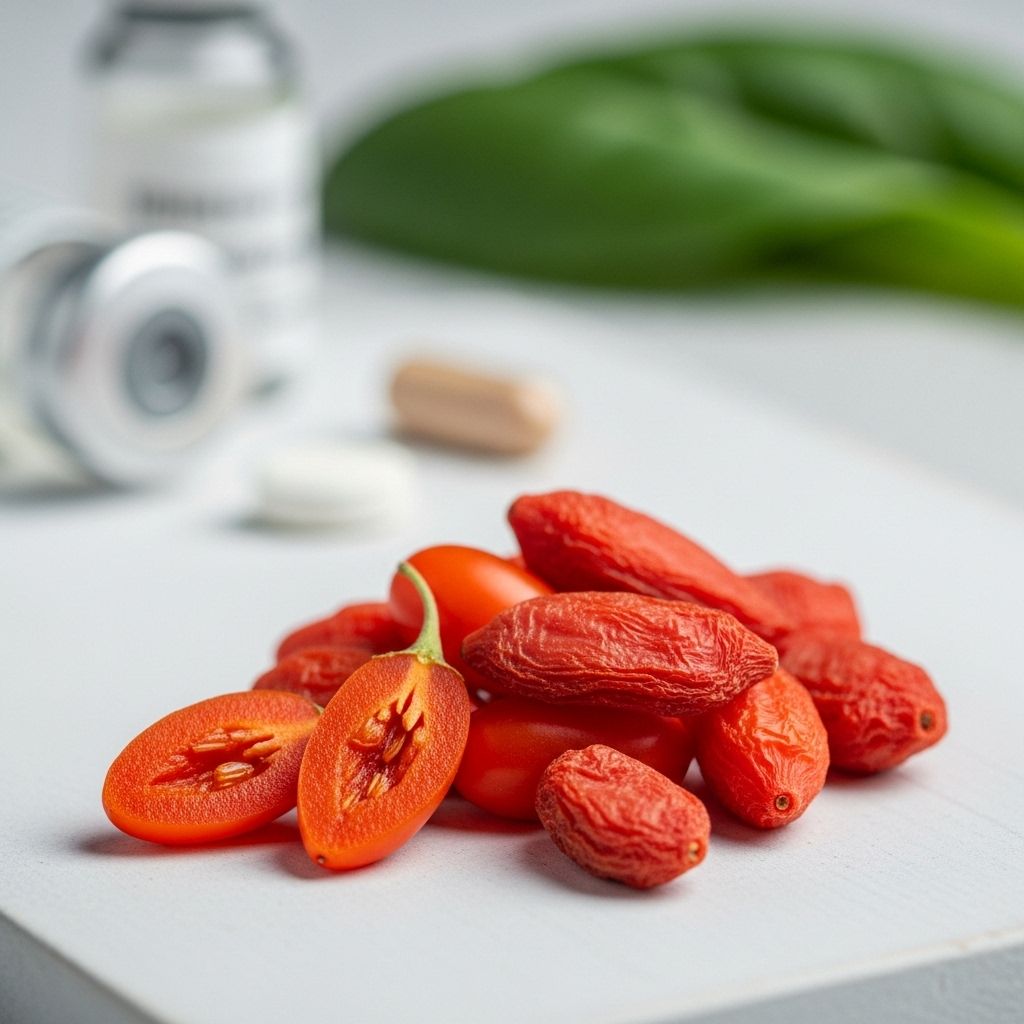Goji Berries: Side Effects, Allergic Reactions, Interactions, and Safety Tips
Spotting warning signs early lets you enjoy your favorite superfood with peace of mind.

Goji berries, also known as wolfberries, have gained immense popularity as a superfood due to their impressive nutrient profile and array of health benefits. However, despite their reputation as a healthy addition to many diets, it is vital to be aware of their possible adverse effects, certain allergic responses, and their interactions with medications. This comprehensive guide examines the side effects of goji berries, people most at risk, and important safety tips for everyday use.
Table of Contents
- Why Caution Is Needed With Goji Berries
- Top Side Effects of Goji Berries
- Who Should Avoid Goji Berries?
- Potential Drug Interactions
- How to Eat Goji Berries Safely
- Frequently Asked Questions (FAQs)
- Conclusion
Why Caution Is Needed With Goji Berries
Goji berries are nutrient-rich, containing antioxidants such as beta-carotene, polysaccharides, and zeaxanthin, which may support immune, skin, and eye health. Despite these benefits, they can cause adverse effects in susceptible individuals, particularly when consumed excessively or in combination with certain medications .
- Some individuals may experience allergic reactions.
- Goji berries may interact with medications like blood thinners, diabetes pills, and blood pressure drugs .
- Pregnant and breastfeeding women should use caution or avoid goji berries due to compounds that may pose risks .
Top Side Effects of Goji Berries
Most healthy adults can consume goji berries in moderation with little risk of problems. However, certain potential side effects have been identified, particularly in those with sensitivities or underlying health concerns.
1. Allergic Reactions
- Allergic symptoms can include skin rashes, itching, swelling, tingling in the mouth, or difficulty breathing.
- People allergic to tobacco, peaches, tomatoes, or certain nuts might be more likely to react to goji berries .
- Cross-reactivity between these foods and goji berries has been reported .
2. Gastrointestinal Discomfort
- High consumption can cause stomach pain, nausea, vomiting, or diarrhea .
- Some people may experience indigestion or a mild laxative effect when eating excess dried goji berries.
3. Hypoglycemia (Low Blood Sugar)
- Goji berries, especially the root bark, may lower blood sugar levels.
- This effect can be dangerous for people on diabetes medications, leading to symptoms like sweating, dizziness, or fainting .
4. Hypotension (Low Blood Pressure)
- Certain compounds in goji berries can lower blood pressure.
- Individuals who already have low blood pressure or those taking antihypertensive drugs should monitor their blood pressure closely .
5. Potential for Drug Interactions
- Goji berries can interact with warfarin (a blood thinner), increasing the risk of excessive bleeding and bruising .
- Interactions with some heart medications (such as flecainide) may increase toxicity risk .
- They may also affect drugs metabolized by the liver (via CYP2C9 enzymes), potentially altering drug effectiveness or side effects .
6. Pregnancy and Breastfeeding Concerns
- Goji berries contain betaine, a compound which animal studies suggest could trigger uterine contractions and even miscarriage .
- There is a lack of research proving their safety during breastfeeding; experts recommend avoiding consumption during pregnancy and lactation unless advised by a doctor .
Who Should Avoid Goji Berries?
The following groups should be cautious or avoid goji berries entirely:
- People with food allergies—especially those allergic to nightshades (tomatoes, eggplant, peppers), nuts, or peaches.
- Individuals on blood thinners (like warfarin), diabetes medications, or blood pressure medications.
- Pregnant and breastfeeding women due to insufficient safety data and potential miscarriage risk .
- Those with low blood sugar or low blood pressure, or anyone susceptible to fluctuations in these levels .
Potential Drug Interactions
Goji berries may interact with several common medications, possibly leading to adverse or dangerous outcomes. Below is a table highlighting the main drug categories and the risk associated with goji berry consumption.
| Drug Category | Medication Example | Potential Issue |
|---|---|---|
| Blood Thinners | Warfarin | Risk of increased bleeding or bruising |
| Blood Pressure Medications | Antihypertensives | Blood pressure may drop too low |
| Diabetes Medications | Insulin, Metformin, Sulfonylureas | Blood sugar may drop too low, risking hypoglycemia |
| Heart Medications | Flecainide | Increased risk of drug toxicity |
| Liver-Metabolized Drugs | CYP2C9 substrates | Altered metabolism and unpredictable drug levels |
If you are taking any of these medications, speak with your doctor before adding goji berries to your diet .
How to Eat Goji Berries Safely
For most healthy adults, moderate consumption of goji berries is considered safe. However, consider the following safety tips:
- Portion control: Limit intake to a small handful (up to 15 grams daily), especially if you are new to goji berries .
- Monitor for reactions: Stop eating goji berries if you notice any itching, swelling, digestive upset, or allergic symptoms .
- Consult your healthcare provider: If you take medications or have underlying health conditions, get medical advice before incorporating goji berries .
- Pregnant or breastfeeding? Avoid goji berries unless recommended by your doctor.
- Try alternate forms wisely: Dried berries, powders, and juices are widely available, but buy from reputable sources to avoid contamination.
- Hydrate dried berries: Soak dried berries before adding them to food if you experience digestive issues.
Frequently Asked Questions (FAQs)
Are goji berries safe for everyone?
For most people, eating goji berries in moderation is safe. Individuals with certain allergies, health conditions, or on specific medications should avoid or limit consumption .
What are the symptoms of a goji berry allergy?
Symptoms can range from mild (itchy mouth, rash, hives) to severe reactions like swelling, difficulty breathing, or anaphylaxis. Immediate medical attention may be necessary in the event of a severe reaction .
Can goji berries interfere with my medications?
Yes, especially with blood thinners, antihypertensive, heart, and diabetes drugs. Warfarin is particularly known for dangerous interactions, so doctor supervision is recommended if you combine these .
Is it safe to eat goji berries during pregnancy?
There is insufficient evidence to guarantee safety, and there are possible risks of miscarriage. Pregnant women are best advised to avoid goji berries unless cleared by a medical professional .
How much goji berry is considered safe?
Most experts recommend up to 15 grams (about a handful) per day for healthy adults, but you should always consult your healthcare provider if you have concerns .
Conclusion
Goji berries are nutrient-dense and offer unique health benefits, making them a favorite among superfoods. Yet, understanding their possible side effects, allergy potential, and interactions with medications is crucial for safe consumption. If you have allergies, are pregnant or breastfeeding, or take medications for blood pressure, diabetes, or heart conditions, consult your doctor before adding goji berries to your meals. Moderation and awareness are key to reaping their benefits without unnecessary health risks.
References
- https://draxe.com/nutrition/goji-berry-benefits/
- https://www.rxlist.com/supplements/goji.htm
- https://www.healthline.com/nutrition/goji-berry
- https://www.webmd.com/vitamins/ai/ingredientmono-1025/goji
- https://www.medicalnewstoday.com/articles/322693
- https://www.webmd.com/diet/goji-berries-health-benefits-and-side-effects
Read full bio of medha deb












